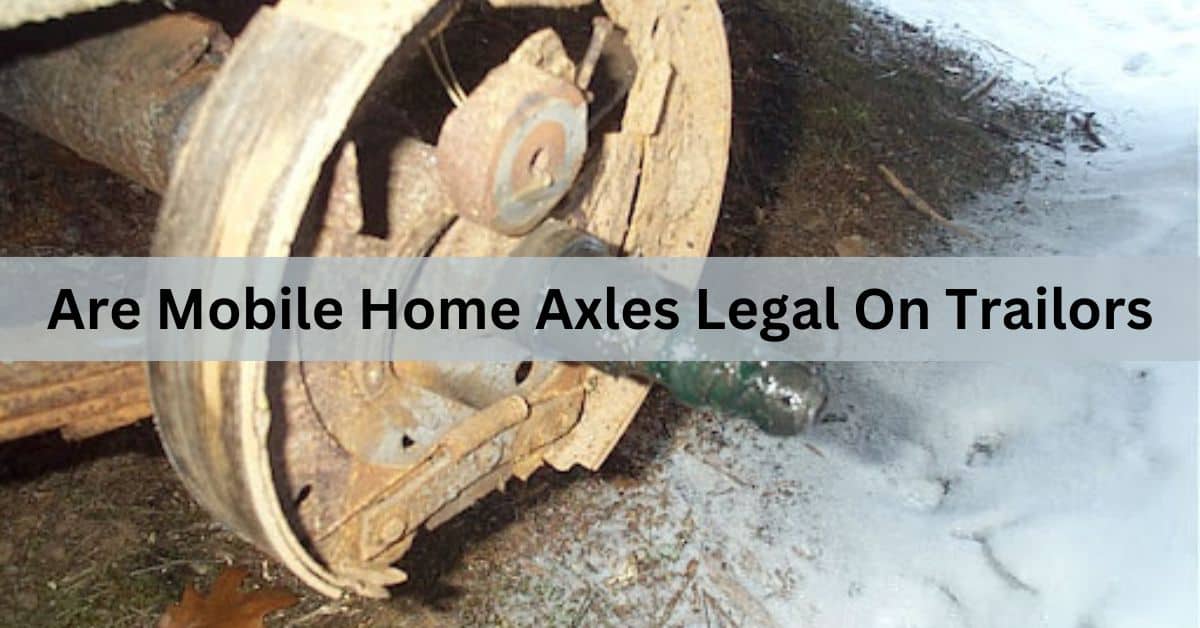Mobile home axles are a cost-effective and readily available option for building trailers, often sparking curiosity about their legal use. However, their legality can be complex due to varying regulations. In this article, we’ll explore whether mobile home axles are permitted on trailers and what guidelines apply.
Mobile home axles on trailers are usually not legal for use on public roads because they often don’t meet safety standards. Many areas require trailers to have axles built to meet Department of Transportation (DOT) standards. Before using mobile home axles, check local laws to avoid fines or safety risks.
In this article, we will discuss “Mobile Home Axles Legal on Trailor’’.
Are Mobile Home Axles Legal on Trailers?
Many trailer owners consider using mobile home axles because they are often available at a lower cost. However, legal issues arise because these axles are typically not designed for long-term or heavy-duty use. Let’s explore why mobile home axles may not be suitable for general trailer use on public roads and the potential consequences of using them.
Understanding Mobile Home Axles and Their Purpose:
- Temporary Use: Mobile home axles are specifically designed to move manufactured homes to a permanent location. Once the home is in place, the axles are often removed, as they are not intended for long-term use.
- Construction Differences: These axles are typically made with cost-saving materials, making them lightweight but less durable than standard trailer axles. This design allows them to support the weight of a mobile home over short distances but not for continuous use on highways.
- Limited Features: Mobile home axles might lack the essential features required for trailers, like brake systems, proper lighting, and load capacity markers. These features are critical for safe travel, especially at highway speeds.
Legal and Safety Standards:
- Department of Transportation (DOT) Requirements: In most places, trailers used on public roads must comply with DOT safety standards, which are in place to protect both drivers and other road users. Mobile home axles often don’t meet these requirements because they’re made for temporary transport.
- Axles Ratings and Certifications: Standard trailer axles are rated and certified for specific weight capacities and types of use. They are also designed to withstand different types of road conditions, including high-speed travel. Mobile home axles typically do not have these ratings, and using them could lead to axle failure or instability.
- Inspection Requirements: In many regions, trailers must pass an inspection to be legally used on the road. Inspections usually check for essential safety features, and mobile home axles often fail to meet the requirements because they lack the necessary load-bearing capacity and structural strength for repeated or long-distance use.
Potential Consequences of Using Mobile Home Axles on Trailers:
- Legal Risks: If mobile home axles are not allowed on public roads in your area, using them could result in fines, impoundment, or legal action. Authorities may classify trailers with non-DOT-approved axles as unsafe, leading to penalties.
- Insurance Issues: In the event of an accident, your insurance company may deny coverage if they find that your trailer used mobile home axles that don’t meet safety standards. This could result in costly repair bills and legal liabilities.
- Safety Hazards: Mobile home axles are not designed to withstand long-term highway speeds or heavy cargo loads, making them prone to overheating, tire blowouts, or even axle failure. These risks not only endanger you but also other road users, especially at high speeds.
Alternatives to Mobile Home Axles:
- DOT-Approved Trailer Axles: To ensure that your trailer is safe and road-legal, consider using axles that are certified by the DOT. DOT-approved axles are tested for durability and rated to meet the requirements for public road use, including proper weight distribution and braking systems.
- Upgraded Axle Systems: If you’re working with a custom trailer, look for a reputable manufacturer who can provide axles that are specifically designed for your needs. High-quality trailer axles may be a bigger investment initially, but they offer long-term safety and compliance with the law.
- Second-Hand Trailer Axles: If cost is a concern, consider looking for used trailer axles from reliable sources. Many used trailer axles are still DOT-approved and can offer a more affordable alternative while meeting safety standards.
How to Check Local Regulations?
- Consult Your Local Transportation Department: Since laws can differ significantly by state or country, it’s essential to check with your local Department of Transportation or motor vehicle department. They can provide specific information about whether mobile home axles are allowed on trailers and what requirements need to be met.
- Review Trailer Inspection Guidelines: If your region requires trailers to be inspected, look up the guidelines to understand the specific standards for axles, brakes, and safety features. Most inspection guidelines explicitly mention DOT requirements, and mobile home axles often won’t meet these standards.
The Costs and Benefits of Compliance:
- Long-Term Savings: While mobile home axles may be cheaper initially, using DOT-approved axles can save you money in the long run by reducing repair costs and avoiding fines. Properly rated axles last longer, reducing the need for frequent replacements.
- Improved Safety and Performance: DOT-approved axles enhance trailer performance by providing better weight distribution, stability, and braking power. These features are critical for safe operation, especially on highways or when carrying heavy loads.
How much weight can mobile home axles handle?
Most mobile home axles can carry 3,500 to 7,000 pounds each. With multiple axles, total capacity increases (e.g., two 7,000-pound axles can handle 14,000 pounds). These axles are usually for single-use transport, not continuous heavy loads. Condition of axles, tires, and road quality can affect capacity.
Can you convert mobile home axles to regular hubs?
Yes, you can convert mobile home axles to regular hubs, but it requires specific modifications. Mobile home axles are typically built for one-time use and often have unique hub and spindle designs that aren’t standard for other trailers.
What are mobile home axles?
Mobile home axles are specialized axles designed to support and transport manufactured homes. Unlike traditional vehicle axles, these axles are built to handle the unique weight and structure of mobile homes during transportation to their permanent locations.
How many axles does a mobile home have?
Mobile homes, also known as manufactured homes, are a popular housing option due to their affordability and flexibility. A common question among prospective buyers or owners is: How many axles does a mobile home have? Understanding the axle configuration of mobile homes is essential for transportation, stability, and even insurance purposes. This article delves into the details of mobile home axles, helping you make informed decisions.
Are mobile home axles legal on trailers in TENNESSEE?
In Tennessee, mobile home axles on trailers are generally not DOT-approved for regular road use due to safety and durability concerns. Trailers must meet state safety standards, which mobile home axles often don’t fulfill. For legal use, it’s best to verify with the Tennessee Department of Transportation.
Mobile home axles conversion kit?
A mobile home axle conversion kit allows you to modify mobile home axles for standard trailer use, including adding brakes and hubs that meet DOT standards. These kits improve safety and compatibility for regular road use. Check local laws to ensure the conversion is legal in your area.
Mobile home axles on trailer?
Using mobile home axles on a trailer is often discouraged, as they don’t typically meet DOT standards for regular road use. They’re designed for limited transport and may lack durability. Always check local regulations to ensure compliance.
Also Read: LibGuides Mobile Banner CSS – A Complete Guide of 2024!
Mobile home axles for sale?
Mobile home axles are available for sale through specialty trailer and salvage yards, often at lower prices than standard axles. These axles are usually designed for limited use, so verify if they meet local road safety standards before purchasing. Always inspect for wear and compatibility with your trailer setup.
Mobile home axle specs?
Mobile home axle specs typically include a weight rating between 3,500 to 7,000 pounds, depending on the model. They usually come with unique brake and hub configurations suited for temporary use. Check compatibility and ensure they meet road-use standards if considering for a trailer.
Trailer house axle capacity?
Trailer house axles generally have a load capacity ranging from 3,500 to 7,000 pounds each. These axles are designed primarily for transporting mobile homes and may not meet DOT standards for regular trailers. Always verify weight limits and legal requirements for safe use.
FAQ’s:
1. Are mobile home axles legal on trailers?
Mobile home axles are generally not legal for regular road use on trailers, as they don’t meet DOT safety standards in most areas.
2. How much weight can mobile home axles handle?
Most mobile home axles can support between 3,500 and 7,000 pounds, but they’re intended for short-term transport only.
3. Can mobile home axles be converted for regular trailer use?
Yes, mobile home axles can be converted with a conversion kit, which includes hubs and brakes that meet DOT standards.
4. What are mobile home axles used for?
Mobile home axles are designed to transport manufactured homes to a permanent location and are typically removed afterward.
5. Why aren’t mobile home axles suitable for trailers?
Mobile home axles lack the durability and safety features, like proper braking systems, needed for continuous use on public roads.
Conclusion:
In conclusion, using mobile home axles on trailers is generally not legal for road use because they don’t meet safety standards required by the DOT. These axles are designed for short-term transport and lack necessary features for ongoing trailer use. For safer, legal options, consider DOT-approved axles or consult your local transportation department for guidelines.
I’m Arlo Liam, and I bring over 10 years of hands-on experience in the mobile technology field. My journey in mobile technology has been driven by a passion for innovation, usability, and the evolving digital landscape.
From understanding the inner workings of smartphones to exploring emerging trends in mobile software and app development, I am committed to sharing in-depth insights and practical knowledge with users of all levels.



